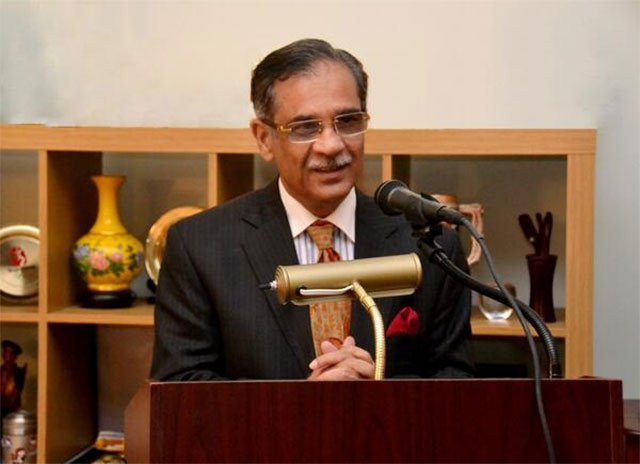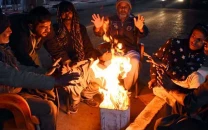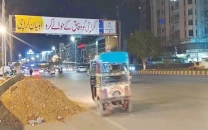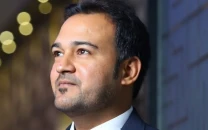2017 – The year of judicial actions
Superior courts in Sindh took up a number of public interest issues

Concerned about the failure or shortcomings of governance, the superior courts seemed to be conveying the message that they would set things right, particularly in the education, health, water and sanitation sectors.
Chief Justice of Pakistan Mian Saqib Nisar’s remarks about the role the judiciary intends to play might not have been well received by politicians and civil society, but in Sindh the judiciary played a vital role in the redressal of pubic grievances in the outgoing year.
The apex judiciary dealt with issues deeply rooted in the administration and its failure to safeguard the fundamental rights of the people. It issued directives to federal and provincial governments to put in place measures for the protection of the fundamental rights to ‘life and property’ of the residents of Sindh.
Water and sanitation
The outgoing year witnessed a rare grilling of Sindh Chief Minister Murad Ali Shah by the SC, which showed him the ‘thrust and filth’ of the province in a short documentary as his party’s second consecutive government failed to improve the provision of basic amenities - potable water, improved sanitation and a pollution-free environment.
Sindh govt summons names of corrupt officials
In yet another rare move, the apex court constituted a judicial commission to carry out province-wide inspections to investigate the authorities’ negligence in protecting freshwater sources, the environment and marine life.
The commission, constituted on a petition filed by Advocate Shahab Usto, highlighted the dismal state of basic amenities’ provision and exposed the government’s negligence improving them.
It also exposed corrupt practices rampant in public sector spending, as almost all the schemes meant to provide clean drinking water and improve sanitation were not completed while some had not even been initiated. Yet the money still continued to flow like blood into the veins of the administration.
CM Shah, who is heading the Pakistan Peoples Party’s (PPP) second consecutive government in the province since 2008, will now present a definite timeframe on the completion of such development schemes to the apex court. Chief Secretary Muhammad Rizwan, on different occasions, himself conceded before the court that ‘now’ work will be done only because of the Supreme Court’s directives.
Water woes
Another startling disclosure made in court this year was that up to 90% of water supplied in Karachi is unfit for human consumption due to the presence of bacterial contamination caused by mixing of the sewage and other factors revealed a report submitted to the judicial commission this year.
Accountability watchdog triumphs in six-hour game of ‘NAB me if you can’
The Pakistan Council of Research in Water Resources conducted analysis of 118 drinking water samples collected from Karachi - 99 from surface water sources like supply systems, filtration plants and pumping stations, 13 from underground water sources, three from reverse osmosis (RO) plants and three from other ground and surface water sources.
On the commission’s order, 460 water samples were collected from all over Sindh, 232 or 50.4% were collected from surface water, 179 or 39% from groundwater, 46 or 10% from RO filtration plants and three or 0.6% from mixed sources.
Marine pollution
The apex court recently directed the additional attorney-general to communicate to the prime minister to do the needful to help the provincial government control growing marine pollution caused by dumping of 460 million gallons of toxic untreated industrial effluent and domestic waste into the sea every day.
The court passed this direction with regard to the recently approved joint plant of the federal and provincial governments to install five combined effluent treatment plants across Sindh for the treatment of industrial and domestic waste. The matter is still pending.
Encroached upon recreational spaces
Nearly 35,000 amenity plots across the metropolis are under encroachment and are being used for commercial activities. The SC ordered the Karachi Development Authority (KDA) and Karachi Metropolitan Corporation (KMC) to retrieve such recreational spaces from land grabbers.
Sindh govt not letting IG perform duties, court told
This issue emerged surprisingly during the hearing of a case filed by Sabiha Parveen who had sought contempt of court proceedings against the KDA officials for allotting her an amenity plot in lieu of a residential plot.
Amazed at how a space originally earmarked for the purpose of recreational activities could be allowed by the authorities to be used for residential purposes, the judges had sought details of all the amenity spaces allotted by the KDA for residential or commercial use in violation of the SC’s judgments and orders.
Submitting a report on the court’s order, the KDA land director revealed that 35,000 amenity plots were under encroachment in the city.
To ensure that the fundamental rights concerning right to life and right to live in a better environment were protected, the apex court ordered on November 30 removal of all sorts of encroachments from the amenity plots within a deadline of two months. The matter is not yet finally disposed of.
NAB’s [clipped] powers
As Pakistan faces an ongoing drive to purge the country of corruption, which also resulted in the disqualification of an elected prime minister, the SHC reserved its verdict in the controversial matter relating to operational jurisdictions of the National Accountability Bureau (NAB) in the provinces.
Water, sanitation conditions: SC seeks Sindh government's reply to contempt of court plea
The PPP-led provincial government used its majority in the Sindh Assembly to pass the National Accountability Ordinance, 1999 Repeal Act to clip the federal anti-graft watchdog’s powers to operate in the province.
Playing the political card, opposition parties such as the Muttahida Qaumi Movement – Pakistan, Pakistan Muslim League - Functional, Pakistan Tehreek-e-Insaf and rights campaigner Pasban Pakistan had challenged the Act that provided for transferring all the inquiries from NAB to the provincial anti-corruption authority.
In August, the SHC had allowed NAB to continue with pending inquiries and investigations initiated against former and sitting politicians and government functionaries till the final disposal of the case. The order in the case was reserved.
In a report, the NAB prosecutor disclosed before the court that the bureau was investigating corruption-related cases against 1,500 currently serving or retired government lawmakers and functionaries.
Removing corrupt officials
Nearly 500 corrupt officials, who got restored to their posts after entering into plea bargains and voluntarily returned appropriated money to NAB, are now facing removal from their posts.
While hearing a petition of a district accounts officer who was restored to his position after returning embezzled money, the judges had widened the scope of the case, calling names of all such officers enjoying official authority despite confessing to corruption and returning the plundered money to NAB.
SHC suspends notification declaring 1,061 buildings as heritage sites
IG’s appointment case
The Constitution guarantees safety and security of life to every citizen, but the Sindh police’s inspectors-general themselves had no job security.
In a landmark case, the Sindh High Court (SHC) ruled this year that Sindh IG Allah Dino Khawaja will complete the tenure of his service, as already held by the Supreme Court in the famous Anita Turab case, in addition to exercising his full official authority and powers to effectively and efficiently handle the administrative affairs of his force.
The case was brought to the court by civil society members, including the Pakistan Institute of Labour Education and Research Executive Director Karamat Ali, Pakistan Fisherfolk Forum’s General Secretary Saeed Baloch and others.
The activists’ move came following a dramatic change of events, as the provincial government attempted to remove IG Khawaja in December 2016 reportedly for not following its orders.
The drama continued as the PPP-led government once again tried to get rid of the ‘defiant’ IG, but this time by unilaterally surrendering his services to the federal government and appointing Additional IG Abdul Majeed Dasti in his place.
A thorn in their side: Court allows NAB to proceed with pending inquiries
The move was once again blocked by civil society, which sought contempt of court proceedings against the authorities concerned. Finally, the judges passed a judgment declaring that the provincial government could not interference in the administrative affairs of the police department, including removing the IG without completing his tenure.
Un-terrorizing crime
While deciding another high-profile case concerning law and order, the SHC’s anti-terrorism appellate bench ruled that the case relating to the murder of Shahzeb Khan does not fall within the ambit of the Anti-Terrorism Act.
Setting aside the death sentence awarded to Shahrukh Jatoi, Nawab Sajjad Talpur and life imprisonment to Siraj Talpur and their servant Ghulam Murtaza Lashari, the high court sent the case to the ordinary sessions court for re-trial.
The cold blooded murder of a police deputy superintendent’s son by the accused over Lashari harassing the former’s sister sparked country-wide protests and debate on whether the powerful would ever pay the price for their crimes in Pakistan.
After showering praises on the system over the conviction of criminals, their release on bail after compromising with the victim’s family has once again sparked a debate among Pakistanis on the social imbalances and poor governance in the country.



















COMMENTS
Comments are moderated and generally will be posted if they are on-topic and not abusive.
For more information, please see our Comments FAQ